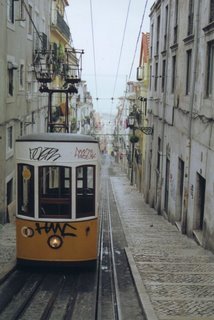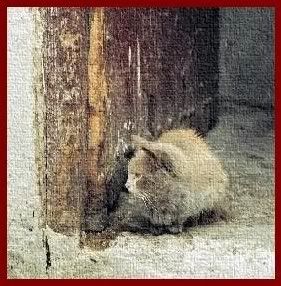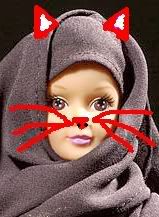 A few weeks ago, Mr. Cat in Rabat and I found ourselves leaning against a railing in a subway train in Madrid when I suddenly had one of those rare (for me) epiphanic moments wherein the obvious is suddenly charged with great import.
A few weeks ago, Mr. Cat in Rabat and I found ourselves leaning against a railing in a subway train in Madrid when I suddenly had one of those rare (for me) epiphanic moments wherein the obvious is suddenly charged with great import."Look!" I cried (and probably possibly pointed rather rudely). "Everyone is reading!"
And they were; for the most part, all of our fellow metro passengers were reading books, newspapers and to a lesser degree, magazines.
"So?" Mr. CinR responded. "That's normal."
Lisbon was much the same. On trams, buses, subways and funiculars (like Bica above) alike, commuters were reading. I tried (unsuccessfully) not to gawk at this alien race of people intently staring at the wads of bound paper in their hands. In every city we visited, bookstores successfully competed with clothing stores and cafés, each boasting its own speciality, each with multilingual sections, each packed with browsing & paying customers. Such bliss!
"Is it?” I wondered. Cripes, it is. Where have I been?
Morocco.
Official statistics indicate that Morocco has a 38% illiteracy rate although those in the know (and not on the government payroll) suggest that this number is too low. Nevertheless, Morocco has made great strides in recent years to combat illiteracy. In 2005, UNESCO ranked Morocco 124th out of 177 for its overall literacy. Less than 50 years ago, the rate was a staggering 80%. The “March Towards Light" campaign was inaugurated in 2003 with the objective of keeping kids in school and eradicating illiteracy by the year 2015. At that time, a staggering 3 out of 5 women could not read or write; their numbers swell to 2 out of 3 in rural parts of the country.
It is a laudable but ambitious goal (projected numbers have proved a little over optimistic) considering that the inability to read isn’t the only problem facing campaign organizers: Morocco is not a nation of readers. With the exception of Koranic tracts, newspapers (of which there are 700 in the country with a total readership of a scant 300,000) and the odd Paris Match magazine, I (emphasis on "I") have never seen a soul in Rabat read a book at a café, on a train, or waiting at a bus stop. Simply put, this is not an exaggeration on my part. I wish it were.
And if a nonreading population isn't bad enough, consider this:
“… illiteracy is leading to a split between these people and the elite …But the political elite are not all literate either. Moroccan law requires that members of parliament and municipality leaders must have at least a primary school certificate. After the last elections in 2002 and 2003, many such certificates presented by winning candidates were found to have been forged.” (CinR's emphasis)
This is so antithetical to the way I was raised that I simply cannot comprehend a world without books. Our parents read to my brother and I before bedtime; we were encouraged to read for ourselves when we became a certain age; our bookshelves were routinely replenished with fresh Nancy Drew and Hardy Boys volumes; weekend trips to the public library were considered a natural way to spend a Saturday; used book stores acquired an importance early in our lives that has never diminished. Like my father, I never go anywhere without a book – you just never know when you’ll have a spare moment to read a few pages. And what else do you do on a bus?
But is this a world without books? Are there bookstores in Rabat? Some; for the most part, they carry French and Arabic titles. Who’s reading them? Obviously some people – I’m not suggesting that no one reads in Morocco, only that I haven’t seen any of them yet. Possibly the ex-pat community keeps the librairies alive, who knows? I routinely ask students “What do you like to read?” and the answer I invariably receive is “I don’t like to read” or, for those with a greater command of English, “I hate reading”. I should really just stop posing the question but I keep hoping that one day, a student will raise her hand and say “I just love the luxuriance of Michael Ondaatje's writing”. Or more likely, "Harry Potter is okay".
Are literacy programmes enough? Surely they're a start (some 640,000 Moroccans attended literacy classes last year - 30% lower than their projection) but how will this alone instill a love of reading when television is still considered a preferable alternative to passing one's time? Surely a parent's greatest legacy to their child is a love of books just as it's a government's moral duty to the advancement of its people. But I cannot help but wonder if one of the problems beleaguering both the push to literacy and to reading-for-pleasure is Morocco’s linguistic heritage. Is it possible that this seemingly alternate world of literary appreciation is guarded by a tongue-tied Cerberus, whose 3 heads speak French, standard Arabic and Derija? Most Moroccans I talk to will admit that they aren’t fluent in any one of Morocco’s languages; instead they muddle (with varying degrees of proficiency) in one or two of the three. Amazingly, Morocco’s indigenous dialect is not rendered as a written script. Perhaps it should. Perhaps I too would take exception to not having a literary tradition transposed in my mother tongue.
A few months ago, a colleague of mine forced (and I don’t choose the word lightly) a class of 20-somethings to read a very abridged version of “Treasure Island” as part of a university prep course we were teaching. Not her first choice in fiction, it was the only title she could lay her hands on in large quantities for next to nothing. Not surprisingly, this decision was met with a formidable amount of resistance. Most balked, some refused, and after sensing that it just might feel better to stop hitting her head against this self-made brick wall, she conceded defeat. Unbeknownst to us, one young woman persevered and amazingly completed this tale, a tale made more difficult by its archaic language and nautical terms. When Basma went on to take her TOEFL exam – the English language exam that all non-English speaking university applicants must take – she was thrilled to find that her oral examination question was “What is your favourite book, and why?” She told us afterwards that she spoke about “Treasure Island”, that it was her favourite book because it was the first book she had ever read, and that it made her want to continue reading.
Needless to say, we both bawled like babies upon hearing this, but I bet Basma's story would have squeezed a few tears out of Robert Louis Stevenson himself.
*with apologies to Tennessee Williams who did not write "A Streetcar Named Bica" and to Bica who is not really a streetcar.
 A few weeks ago, Mr. Cat in Rabat and I found ourselves leaning against a railing in a subway train in Madrid when I suddenly had one of those rare (for me) epiphanic moments wherein the obvious is suddenly charged with great import.
A few weeks ago, Mr. Cat in Rabat and I found ourselves leaning against a railing in a subway train in Madrid when I suddenly had one of those rare (for me) epiphanic moments wherein the obvious is suddenly charged with great import.







21 Comments:
★Cat You are on the big news!!…
Hard to see my ears under the space helmet!
Although our bookshelves were repleat with Hardy Boys books, I never once read one. I prefered Tom Swift and the Morrow Brothers books (the latter being an obscure science and technology series for boys) that dad bought for me.
I guess your friend can rejoice that she may have helped ~one~ young person discover the joy of books!
"Amazingly, Morocco’s indigenous dialect is not rendered as a written script. Perhaps it should."
The Amazigh language is now rendered (re-rendered?) in the Tifinagh script. Of course, only schoolchildren of a certain age and a few scholars can read it, but it's a start.
Of course, there's all the other arguments about trying to homogenize the Berber language, etc... too much info for here.
L: Is there a movement afoot to make Berber a written language as well?
AYY! You beat me to writing about this. I'll have to go with Plan B, about watching the Superbowl in French.
Anyhow, part of what I was going to say is that last year, I initiated a book club at my school (in English). We read translations of short stories by Mohammed Mrabet - I actually got a really great group together, most of whom finished the book and had great things to say. I also have one favorite student (who is co-directing our drama club play with me) who just borrowed - and finished in THREE DAYS - The Sheltering Sky. But what's so sad is HOW MUCH SHE AMAZES ME. Not just for reading it in English, but for reading.
This is all part of the reason I'm working on building a good library at our school - a lot of my students who don't enjoy reading in French say they do in English - perhaps the conclusion is that French really does suck!
I sympathize. Also, I need your address so I can send you a book!
Tar: I have a handful of books for you as well ... e-mail me when you think you're coming to Rabat. Either that or Mr. CinR and I may pop down to Meknes for the day.
Cat - OK, I know you're trying to bait me, but I shall resist your claw swipes! ;)
All of Bowles' writing should be thrown straight in the trash, except for the Moroccan folktales he translated.
NO!!! I love Paul Bowles!
He was an interesting guy, that's for sure!
Ahaaaar! Jim, lad!!! Look out, or I'll give 'ee the Black Spot!!
"... you'll bring me one noggin of rum, now, won't you, matey?"
@ Cat - did you see this:
http://ghasbouba.blogspot.com/index.html
Anyhow, it's why my current post happened.
Thank you, also - books rock! I'll be by Rabat soon, I'd imagine. You are, of course, "welcome in Meknes."
@ Liosliath - Not ALL! Have you ever read his non-Morocco stuff? Enjoyable.
I love the blog that you have. I was wondering if you would link my blog to yours and in return I would do the same for your blog. If you want to, my site name is American Legends and the URL is:
www.americanlegends.blogspot.com
If you want to do this just go to my blog and in one of the comments just write your blog name and the URL and I will add it to my site.
Thanks,
David
Michael Ondaatje - have you read Anne Michaels 'Fugitive Pieces'?
Rivals if not surpasses the beautiful Michael ... just btw, writes the random kiwi commenter.
I find all of Bowles' work tedious and repetitive - though his non-fiction is slightly less excruciating.
WW: you are a closet Canadian Lit fan! - I loved Fugitive Pieces!
L: let's agree to disagree on Bowles.
Deal!
I'm out of the closet about Canadian writers ... loud and proud even.
While in confessional mode - I have her poetry book too. Blue Vigour is probably one of my favouritest poems.
Sorry, could not have time to either update my own blog or to read your brain-provoking notes. :)
Just a little anectode about Morocco's illiteracy issue.
As you know, I teach maths in ifrane and an illiterate person in French. So I asked my students to help me translate an English text to French so we could send it to a Moroccan newspaper. Their reply was their French is not good enough for that. Ok, I see, than
-"translate it to Fusha-Arabic".
-"Our Arabic is not good either".
-"Hmm, what other language did you say you were able to speak?, Oh Darija"
-"..but darija is not to write.
AHHHHH, I cried, and screamed, wanted to jump out of the window with no fear of death because the buildings here are just one floor.
Well, this is the situation. My students can read, but can not write in their own language. Of course, what you say about Moroccan libraries can also be the truth for all written language across the country? I mean, if moroccans can not write, perhaps it is the expats, who publish the newspapers in Morocco?
hey catinrabat,sounds brandry cool,or perhaps remind me cats walkin around in dar al3irfaan,la cite unuversitaire in rabat when i where student there,anayway ur topic is real abt moroccan troubles with systematic education,goverement is doin nothing,nd the media complete the rest,u a great pionner,after readin ur articles abt "us",moroccans,my respects for ur intelectual interset,thats how things should run in one life s:communication,nd lookin for it.morad from milano
Post a Comment
<< Home